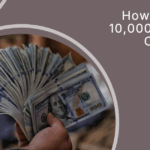Now Reading: 💡 THE “REVERSE BUDGET” THAT HELPED ME SAVE $3K FAST 💡
-
01
💡 THE “REVERSE BUDGET” THAT HELPED ME SAVE $3K FAST 💡
💡 THE “REVERSE BUDGET” THAT HELPED ME SAVE $3K FAST 💡
A Simpler Way to Take Control of Your Money Without Feeling Deprived
Let’s be honest for real — traditional budgeting can feel like a full-time job.
Spreadsheets. Tracking every little expense. Constant guilt.
And by the end of the month, you’re still wondering:
“Where did all my money go?” 😩
That’s exactly where I was… until I tried something completely different.
Something that didn’t involve color-coded charts or meal prepping every day.
It’s called the Reverse Budget — and it completely changed the way I handle money.

🧠 What Is a Reverse Budget?
Instead of budgeting based on what you think you’ll spend —
You start by paying yourself first, and let the rest work around that.
Simple, right?
✅ You choose your savings goal first
✅ You automate that amount to go out as soon as your paycheck hits
✅ Then you live off the rest — guilt-free
This flipped approach removes pressure and forces your priorities to come first, not last.
📌 Step 1: Decide Your Non-Negotiables First
Forget about tracking every $3 coffee for now.
Instead, ask yourself:
💬 “What do I actually want my money to do for me?”
For me, the list looked like:
-
Emergency fund
-
Travel fund
-
Paying off credit card debt
-
A little room for fun — guilt-free
Pick 2–3 financial goals that truly matter to you right now. Not what the internet says. What you care about.
💵 Step 2: Automate Your Savings Before You Spend
This is the magic move.
The moment your paycheck lands → money goes directly into savings/investments, without waiting for you to “decide” later.
Here’s what worked for me:
-
$400/month → high-yield savings (emergency fund)
-
$150/month → travel sinking fund
-
$100/month → credit card debt
-
$50/month → “fun money” stash for guilt-free splurges
💡 Even if you start small ($50 here, $30 there), consistency beats perfection.
📉 Step 3: Let the “Leftovers” Shape Your Lifestyle
Now that your goals are already taken care of, whatever’s left is what you live on.
No spreadsheets. No stress.
You’re not budgeting to restrict yourself. You’re budgeting around freedom.
This naturally makes you more mindful without even trying.
Like…
-
You’ll check the grocery deals before shopping
-
You’ll think twice before adding stuff to your Amazon cart
-
You’ll skip unnecessary subscriptions, just to stretch your lifestyle leftovers
It’s not about saying no to everything — it’s about saying yes to what truly matters.
💬 Real Talk: Why This Worked Better Than Any App Ever Did
This method worked for me because:
-
It’s simple and easy to stick to
-
It focuses on what I care about — not what I “should” do
-
It made saving feel automatic, not painful
-
I didn’t feel like I was constantly checking my budget every time I spent money
Most importantly: It gave me momentum. And once you see your savings account grow — girl, you won’t want to stop. 😍
👉 so as have we broke down the basics of the Reverse Budget —
Where you pay yourself first, then live off the rest.
No complicated spreadsheets. No guilt. No endless tracking.
But here’s the thing:
Once I had that foundation in place, I didn’t stop at just “saving money” —
I started building real momentum.
And that’s exactly what I want to share with you now.
These are the next-level strategies that helped me cross the $3,000 mark faster than I ever expected — and they’re way simpler than you think.
🧺 Step 4: Create Mini-Buckets With Purpose (aka Sinking Funds)
One of the best things I did? I stopped treating all my savings like one big lump sum.
Instead, I created mini “buckets” for specific goals.
Here’s what mine looked like:
-
✈️ Travel fund
-
🩺 Medical fund
-
🎁 Holiday gifts + birthdays
-
🚗 Car maintenance/emergencies
-
📦 “Life happens” fund (for unexpected bills or last-minute expenses)
Even just putting $20/month in each of these took the pressure off so many stressful moments later.
👉 Tip: Use a digital bank that lets you split savings into different folders. No need for 5 bank accounts!
🔍 Step 5: Track Only What Actually Matters
Reverse budgeting doesn’t mean ignoring your spending completely — it means tracking with intention.
Instead of micromanaging every single dollar, I just tracked:
-
My goal progress (how much I’d saved each month)
-
My biggest leak areas (like subscriptions or impulse purchases)
-
My automations (just to make sure they were still aligned)
That’s it. No more “Where did my $4.93 go on a Tuesday night?” stress.
You don’t need to be perfect. You just need to stay aware of what’s working — and what’s not.
📈 Step 6: Adjust Monthly, Celebrate Often
Every month, I sat down with a coffee and looked at three things:
-
Did I hit my savings targets?
-
Was there an expense that surprised me?
-
Can I increase any automations — even by $10?
And every time I hit a milestone — even something small like “first $500 saved” —
I celebrated it. I gave myself permission to be proud.
🎉 Because that $500 meant I showed up for myself — and that’s worth more than any latte.
💬 Final Thoughts: Small Tweaks, Big Wins
Here’s the honest truth no one tells you:
You don’t need to make more money to start saving.
You just need a system that honors your priorities — and lets your money work with you, not against you.
The Reverse Budget isn’t about being frugal to the point of misery.
It’s about choosing purpose over pressure, and clarity over chaos.
If I could save $3K as a busy woman juggling life, stress, and Target runs —
You absolutely can too.
💖 Your Turn Now:
Before the next payday hits, ask yourself:
“What can I automate today that my future self will thank me for?”
Even $50 can start a ripple effect.
Even one auto-transfer can shift your mindset.
Your money is ready to serve you.
You just need to give it a mission — and this reverse budget does exactly that. 💫














